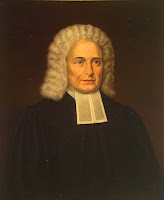 An excellent quote from the writings of Samuel Davies (1723-1761). Davies was a Presbyterian pastor in Virginia whose preaching led to many conversions and new church plants in the later stages of the First Great Awakening. He served for a while as Patrick Henry's pastor, and later succeeded Jonathan Edwards as President of the College of New Jersey (now Princeton University).
An excellent quote from the writings of Samuel Davies (1723-1761). Davies was a Presbyterian pastor in Virginia whose preaching led to many conversions and new church plants in the later stages of the First Great Awakening. He served for a while as Patrick Henry's pastor, and later succeeded Jonathan Edwards as President of the College of New Jersey (now Princeton University).
Please read this quote carefully. It's definitely worth your time.
“What an endless variety of denominations, taken from some men of character, or from some little peculiarities, has prevailed in the Christian world, and crumbled it to pieces, while the Christian name is hardly regarded?... what party-names have been adopted by the Protestant churches, whose religion is substantially the same common Christianity, and who agree in much more important articles than in those they differ. To be a Christian is not enough now-a-days, but a man must also be something more and better; that is, he must be a strenuous bigot to this or that particular church….
“Every man will find that he agrees more fully in lesser as well as more important articles with some particular church than others; and thereupon it is his duty to join in stated communion with that church; and he may, if he pleases, assume the name which that church wears, by way of distinction from others: this is not what I condemn. But for me to glory in the denomination of any particular church, as my highest character; to lay more stress upon the name of a presbyterian or a churchman than on the sacred name of Christian; to make a punctilious agreement with my sentiments in the little peculiarities of a party the test of all religion; to make it the object of my zeal to gain proselytes to some other than the Christian name; to connive at the faults of those of my own party and to be blind to the good qualities of others, or invidiously to represent or diminish them: these are the things which deserve universal condemnation from God and man; these proceed from a spirit of bigotry and faction, directly opposite to the generous catholic spirit of Christianity, and subversive of it. This spirit hinders the progress of serious practical religion, by turning the attention of men from the great concerns of eternity, and the essentials of Christianity, to vain jangling and contest about circumstantials and trifles. Thus the Christian is swallowed up in the partisan, and fundamentals lost in extra-essentials….
“You may, if you please, call yourselves presbyterians and dissenters, and you shall bear without shame or resentment all the names of reproach and contempt which the world may brand you with. But as you should not be mortified on the one side, so neither should you glory on the other. A Christian! a Christian! let that be your highest distinction, let that be the name which you labour to deserve. God forbid that my ministry should be the occasion of diverting your attention to anything else.”
Thursday, May 29, 2008
On denominationalism, and being a Christian
Posted by
Jeff Moss
at
10:25 AM
0
comments
![]()
Tuesday, May 13, 2008
"Is it just Jesus in disguise?" or, Eucharistic Docetism
 The legend tells us of an encounter between the young St. Francis and a leper on the plains outside Assisi. As Francis was riding along, he saw the man, disfigured by such hideous sores that Francis almost turned to flee from him. But the love of God overcame his revulsion. This dignified young man—the son of a wealthy merchant—got down from his horse and embraced the man, and kissed his open sores.
The legend tells us of an encounter between the young St. Francis and a leper on the plains outside Assisi. As Francis was riding along, he saw the man, disfigured by such hideous sores that Francis almost turned to flee from him. But the love of God overcame his revulsion. This dignified young man—the son of a wealthy merchant—got down from his horse and embraced the man, and kissed his open sores.
Sometimes the story is told with a postscript. When Francis remounted his horse and turned to say good-bye to the leper, the man had vanished. The leper had been Christ in disguise.
The addition to the story gets something right, but at a deeper level it is very wrong. If the leper was Jesus and no one else, then what about the sores? What about the rags? Were they only for show, so that Jesus could teach a lesson in disguise and then pass on? But what if the leper was really a leper—a poor man suffering from a grotesque disease—and Jesus was present in him in the midst of his leprosy?
Here is the problem with the doctrine of transubstantiation, the teaching that the bread and wine of the Lord's Supper are changed by Divine power into the literal body and blood of the Lord Jesus, and so cease to be bread and wine. If this is true, then this food and drink cannot bring us to Christ, because the moment they begin to do so, they are no longer food and drink. But if we eat real bread and drink real wine, and through them really eat the flesh of the Son of God and drink His blood ... then God is really in the world, in things and in people. Then Francis met a man with a real and horrible disease, and in him he really met the Lord. Then the Word has really become Flesh. Then Christ really is the Savior of the world. Not a "savior" who would take us out of the world, but a Savior who sends us into the world (John 17:15-18). He has not come to annihilate the creation and put Himself in its place. No!—He has come to take His place in the creation, and so make it truly become itself, what He created it to be.
Because His brothers were really there craving your help, because they really were needy and weak—because it was for them that you did it, He says, you did it for Him!
“And the King will answer and say to them, ‘Assuredly, I say to you, inasmuch as you did it to one of the least of these My brethren, you did it to Me’ ” (Matthew 25:40).
Because it is really bread that you break and eat, therefore you receive the Body of Christ. It must be and remain bread so that you, through it, may receive His real body into yours! If bread had to be absent for Christ to be present, then we could never meet Christ in the material things of God's creation. But it is bread, real bread!—wine, real wine! so that in it we may really meet our Lord!
“Therefore, my beloved, flee from idolatry. I speak as to wise men; judge for yourselves what I say. The cup of blessing which we bless, is it not the communion of the blood of Christ? The bread which we break, is it not the communion of the body of Christ? For we, though many, are one bread and one body; for we all partake of that one bread.” (1 Corinthians 10:14-17).
Posted by
Jeff Moss
at
1:03 PM
5
comments
![]()
Thursday, May 1, 2008
Ascension Day
 Today--forty days after Easter, the holiday of Christ's resurrection--the Church celebrates His ascension into Heaven.
Today--forty days after Easter, the holiday of Christ's resurrection--the Church celebrates His ascension into Heaven.
The Lord Jesus ascended
to His Father;
He sat down at the right hand
of the Mighty One.
From there He will return in glory
to judge the living and the dead,
and there will be no end to His reign.
"Therefore, when they had come together, they asked Him, saying, 'Lord, will You at this time restore the kingdom to Israel?' And He said to them, 'It is not for you to know times or seasons which the Father has put in His own authority. But you shall receive power when the Holy Spirit has come upon you; and you shall be witnesses to Me in Jerusalem, and in all Judea and Samaria, and to the end of the earth.'
"Now when He had spoken these things, while they watched, He was taken up, and a cloud received Him out of their sight. And while they looked steadfastly toward heaven as He went up, behold, two men stood by them in white apparel, who also said, 'Men of Galilee, why do you stand gazing up into heaven? This same Jesus, who was taken up from you into heaven, will so come in like manner as you saw Him go into heaven.'"
--Acts 1:6-11 (NKJV)
Posted by
Jeff Moss
at
10:25 AM
0
comments
![]()
